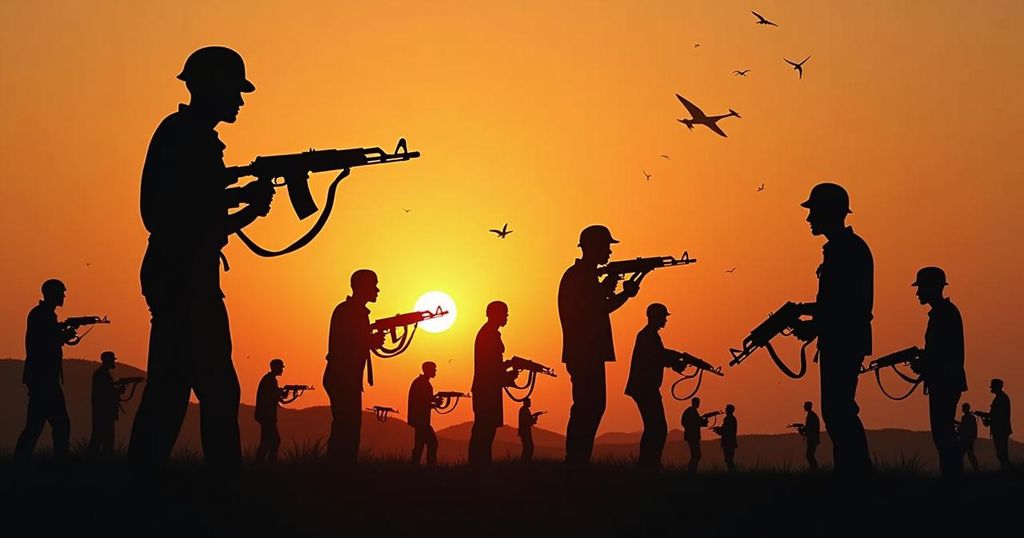On September 23, a White House statement lauding the U.S.-UAE partnership expressed concern for the Sudan crisis, denouncing military solutions while calling for accountability. This positive narrative is complicated by the UAE’s support for the RSF, a group implicated in numerous atrocities and responsible for humanitarian crises affecting millions in Sudan. Discrepancies between U.S. rhetoric and actions raise critical questions about the integrity of its commitment to Sudanese peace and stability, culminating in a narrative of betrayal towards affected civilians.
On September 23, the White House released a statement encapsulating the recent bilateral discussions between President Biden and Sheikh Mohamed bin Zayed Al Nahyan, the leader of the United Arab Emirates (UAE). While the statement extolled the enduring partnership between the United States and the UAE, it simultaneously expressed deep concern regarding the escalating crisis in Sudan. Importantly, it emphasized that there should be no military resolution to this conflict and called for accountability concerning war crimes and atrocities committed in the region. However, this positive rhetoric becomes troubling in light of the UAE’s known support for the Rapid Support Forces (RSF), a faction in the Sudanese conflict. The RSF, described as akin to a criminal organization, has been implicated in widespread atrocities, including ethnic cleansing and sexual violence. Despite urgent appeals from the African Union and the United Nations, the RSF has continued its onslaught on El Fasher, the last major population hub in Darfur not under its control. Compounding the situation, reports from the New York Times have indicated that the UAE’s support for the RSF extends beyond mere military aid; it is delivered under the guise of humanitarian assistance aimed at supporting the Sudanese populace. This dual approach not only damages the integrity of humanitarian organizations like the Red Cross but also exacerbates the suffering of millions of Sudanese who find themselves devoid of basic necessities and facing imminent famine. Currently, approximately twelve million individuals have been uprooted from their homes, and countless civilians are facing starvation as conflict parties neglect their obligation to ensure humanitarian access. The paradox of Washington’s diplomatic posture raises critical questions; first and foremost, how can the U.S. legitimately project itself as a partner for stability in Sudan while indirectly colluding with the UAE in this deceptive narrative? Additionally, how does the United States plan to enforce accountability for the numerous promises that have repeatedly been disregarded by conflicting parties when its own statements lack congruence with the prevailing reality? Such contradictions place even greater burden on the beleaguered Sudanese civilian population, who are grappling with the toll of sustained warfare and approaching famine. One can only hope that the illusion presented in the White House statement is a strategic maneuver aimed at compelling the UAE to curtail its damaging actions in Sudan. Mere days after his engagement with bin Zayed, President Biden addressed the United Nations General Assembly with a clarion call: \”the world needs to stop arming the generals, to speak with one voice and tell them: Stop tearing your country apart. Stop blocking aid to the Sudanese people. End this war now.\” It remains to be seen whether he conveyed this imperative during their private discussions, yet the lack of corroborative evidence renders his public exhortation appear disingenuous. Ultimately, these contrasting remarks culminate in a narrative of betrayal, wherein the U.S. appears to align itself with a wealthy Gulf state while undermining the plight of Sudanese citizens.
The ongoing conflict in Sudan, particularly involving the RSF, has resulted in widespread atrocities and humanitarian crises. As factions vie for control and power, international actors such as the U.S. and UAE play complex roles, often resulting in contradictory public statements. The Washington administration’s diplomatic communications about Sudan are scrutinized against the backdrop of the UAE’s involvement, raising questions about the effectiveness and sincerity of U.S. foreign policy in promoting peace and stability in the region.
In conclusion, the mixed messages from Washington concerning the UAE’s role in the Sudanese conflict highlight a concerning disconnect between rhetoric and reality. While the U.S. publicly affirms its commitment to peace, its partnerships may undermine efforts to provide meaningful humanitarian support to civilians suffering from the devastating conflict. The juxtaposition of statements from the White House and the actions of its partners poses challenges to credible engagement in Sudan, necessitating a reevaluation of American foreign policy in addressing the crisis.
Original Source: www.cfr.org







